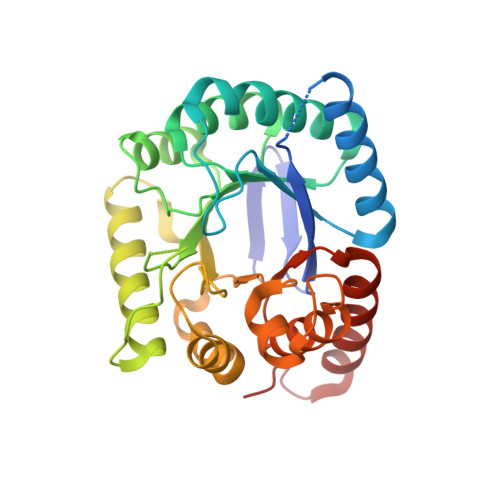Molecular mechanism of plasmid-borne resistance to sulfonamide antibiotics.
Venkatesan, M., Fruci, M., Verellen, L.A., Skarina, T., Mesa, N., Flick, R., Pham, C., Mahadevan, R., Stogios, P.J., Savchenko, A.(2023) Nat Commun 14: 4031-4031
- PubMed: 37419898
- DOI: https://doi.org/10.1038/s41467-023-39778-7
- Primary Citation of Related Structures:
7S2I, 7S2J, 7S2K, 7S2L, 7S2M, 7TQ1, 8SCD - PubMed Abstract:
The sulfonamides (sulfas) are the oldest class of antibacterial drugs and inhibit the bacterial dihydropteroate synthase (DHPS, encoded by folP), through chemical mimicry of its co-substrate p-aminobenzoic acid (pABA). Resistance to sulfa drugs is mediated either by mutations in folP or acquisition of sul genes, which code for sulfa-insensitive, divergent DHPS enzymes. While the molecular basis of resistance through folP mutations is well understood, the mechanisms mediating sul-based resistance have not been investigated in detail. Here, we determine crystal structures of the most common Sul enzyme types (Sul1, Sul2 and Sul3) in multiple ligand-bound states, revealing a substantial reorganization of their pABA-interaction region relative to the corresponding region of DHPS. We use biochemical and biophysical assays, mutational analysis, and in trans complementation of E. coli ΔfolP to show that a Phe-Gly sequence enables the Sul enzymes to discriminate against sulfas while retaining pABA binding and is necessary for broad resistance to sulfonamides. Experimental evolution of E. coli results in a strain harboring a sulfa-resistant DHPS variant that carries a Phe-Gly insertion in its active site, recapitulating this molecular mechanism. We also show that Sul enzymes possess increased active site conformational dynamics relative to DHPS, which could contribute to substrate discrimination. Our results reveal the molecular foundation for Sul-mediated drug resistance and facilitate the potential development of new sulfas less prone to resistance.
- Department of Chemical Engineering and Applied Chemistry, University of Toronto, Toronto, ON, M5S 1A4, Canada.
Organizational Affiliation:

















